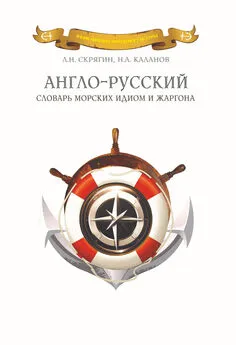Adam Makkai - Словарь американских идиом: 8000 единиц
- Название:Словарь американских идиом: 8000 единиц
- Автор:
- Жанр:
- Издательство:неизвестно
- Год:неизвестен
- ISBN:нет данных
- Рейтинг:
- Избранное:Добавить в избранное
-
Отзывы:
-
Ваша оценка:
Adam Makkai - Словарь американских идиом: 8000 единиц краткое содержание
Это обновленное и дополненное издание, содержащее более 8000 идиоматических
слов и выражений, причем каждое из которых снабжено грамматическим объяснением
и практическим примером. Словарь содержит лексемные идиомы, фразеологические
единицы и поговорки, имеющие особенное значение. В нем приведены наиболее
употребительные выражения только американского английского языка. Этот словарь — идеальное пособие для студентов, часто разъезжающих бизнесменов и просто
путешественников.
Словарь американских идиом: 8000 единиц - читать онлайн бесплатно полную версию (весь текст целиком)
Интервал:
Закладка:
[look into] {v.} To find out the facts about; examine; study; inspect. •/ The mayor felt he should look into the decrease of income from parking meters. / •/ Mr. Jones said he was looking into the possibility of buying a house. / Compare: GO INTO(4), SEE ABOUT.
[look like a million dollars] {v. phr.} , {informal} To look well and prosperous; appear healthy and happy and lucky; look pretty and attractive. •/ John came back from Florida driving a fine new car, tanned and glowing with health. He looked like a million dollars. / •/ Dressed in the new formal and in a new hairdo, Betty looked like a million dollars. / Compare: FEEL LIKE A MILLION.
[look like the cat that ate the canary]or [look like the cat that swallowed the canary] {v. phr.} To seem very self-satisfied; look as if you had just had a great success. •/ Peter bet on the poorest horse in the race and when it won, he looked like the cat that ate the canary. / •/ When she won the prize, she went home looking like the cat that swallowed the canary. /
[look on]or [look upon] {v.} 1. To regard; consider; think of. •/ The stuff had always been looked on as a worthless factory waste. / •/ Until the day Bob made the touchdown, the other boys had looked upon him as rather a sissy. / 2. To be an observer; watch without taking part. •/ Fred had never been able to do more than look on at athletic sports. / •/ The children played in the park while their mother looked on. / Compare: SIT IN.
[look oneself] {v. phr.} To appear self-possessed and well; look or seem in full possession of your abilities and in good health; to appear all right or normal. •/ Mary had had a long illness, but now she looked quite herself again. / •/ It had been a big night, and Uncle John had been drinking freely, but he looked entirely himself after a night’s sleep. / — Often used in the negative. •/ What’s wrong with Larry? He doesn’t look himself. /
[lookout]See: ON THE LOOKOUT.
[look out]or [watch out] {v.} 1. To take care; be careful; be on guard. — Usually used as a command or warning. •/ "Look out!" John called, as the car came toward me. / •/ "Look out for the train," the sign at the railroad crossing warns. / 2. To be alert or watchful; keep watching. •/ A collector of antique cars asked Frank to look out for a 1906 gas head lamp. / Compare: EYE OUT, ON THE WATCH. 3. {informal} To watch or keep (a person or thing) and do what is needed; provide protection and care. — Used with "for". •/ Lillian looked out for her sister’s children one afternoon a week. / •/ Uncle Fred looked out for his brother’s orphan son until the boy was through college. / Compare: LOOK AFTER.
[look out for] {v. phr.} To watch out for; be on the alert. •/ There were signs along the highway warning drivers to look out for deer crossing. /
[look over] {v.} To look at and try to learn something about; look at every part or piece of or at every one of; examine; inspect; study. •/ I looked hurriedly over the apples in the basket and took one that looked good. / •/ Mrs. Jones spent the evening looking over the month’s bills and writing checks. / •/ When a new boy comes to school, the others usually look him over rather carefully. / •/ We looked over several kinds of new cars before deciding. / Compare: ONCE-OVER, SIZE UP.
[look sharp] {v.} To be alert; be very attentive; keep a close watch. •/ It pays to look sharp in traffic. / •/ The guide told us to look sharp because there were rattlesnakes around. /
[look small]See: FEEL SMALL.
[look to] {v.} 1. To attend to; get ready for; take care of. •/ Plans had been prepared that looked to every possibility. / •/ The president assigned a man to look to our needs. / 2. To go for help to; depend on. •/ The child looks to his mother to cure his hurts. / 3. See: SEE TO.
[look to one’s laurels]To make sure that your reputation is not spoiled; protect your good name; keep your record from being beaten by others. •/ Tom won the broad jump, but he had to look to his laurels. / •/ Look to your laurels, Joan. Betty says she is going to run against you for head cheerleader. /
[look up] {v.} 1. {informal} To improve in future chances; promise more success. •/ The first year was tough, but business looked up after that. / 2. To search for; hunt for information about; find. •/ It is a good habit to look up new words in a dictionary. / 3. To seek and find. •/ While he was in Chicago, Henry looked up a friend of college days. /
[look upon]See: LOOK ON(1).
[look up to] {v.} To think of (someone) as a good example to copy; honor; respect. •/ Mr. Smith had taught for many years, and all the students looked up to him. / •/ Young children look up to older ones, so older children should be good examples. /
[loop]See: KNOCK FOR A LOOP or THROW FOR A LOOP.
[loose]See: AT LOOSE ENDS, CAST OFF or CAST LOOSE, CUT LOOSE, FAST AND LOOSE, HAVE A SCREW LOOSE, LET LOOSE or SET LOOSE or TURN LOOSE, ON THE LOOSE.
[loose ends] {n.} 1. Parts or things that should be finished or put together. •/ Mary’s composition had many loose ends. / •/ When George came home after a long trip, he started picking up the loose ends. / 2. See: AT LOOSE ENDS.
[lord it over] {v. phr.} To act as the superior and master of; dominate; be bossy over; control. •/ John learned early to lord it over other children. / •/ The office manager lorded it over the clerks and typists. /
[Lord knows]See: GOD KNOWS.
[lose]See: HEADS I WIN, TAILS YOU LOSE.
[lose face] {v.} To be embarrassed or shamed by an error or failure; lose dignity, influence or reputation; lose self-respect or the confidence of others. •/ Many Japanese soldiers were killed in World War II because they believed that to give up or retreat would make them lose face. / •/ John’s careless work made him lose face with his employer. / •/ The banker lost face when people found out he bet on horse races. /
[lose ground]1. To go backward; retreat. •/ The soldiers began to lose ground when their leader was killed. / Compare: GIVE GROUND. 2. To become weaker; get worse; not improve. •/ The sick man began to lose ground when his cough grew worse. / •/ When the Democrats are in power, the Republicans lose ground. / Contrast: GAIN GROUND.
[lose heart] {v. phr.} To feel discouraged because of failure; to lose hope of success. •/ The team had won no games and it lost heart. / Contrast: TAKE HEART.
[lose one’s balance]Contrast: KEEP ONE’S BALANCE.
[lose oneself] {v. phr.} 1. To go wrong; miss your way; become unable to find the right direction. •/ Fred lost himself in the confusion of downtown Boston streets. / 2. To conceal yourself; hide. •/ The pick-pocket lost himself in the crowd and escaped the police. / 3. To become deeply interested and forget yourself; become absorbed. •/ Sometimes Harry would lose himself in a book for an afternoon at a time. / Compare: IN A WORLD OF ONE’S OWN.
[lose one’s grip] {v. phr.} To fail in control or command; lose your strength, force, or ability to lead. •/ Mr. Jones began to lose his grip: he no longer wanted the hard jobs, and he left decisions to others. / •/ When a locomotive engineer loses his grip, he is no longer trusted with express runs. /
[lose one’s head (over)] {v. phr.} 1. To panic. •/ "Let’s not lose our heads," the captain cried. "We have good lifeboats on this vessel." / 2. To become deeply infatuated with someone. •/ Don’t lose your head over Jane; she is already married. / Contrast: KEEP ONE’S HEAD.
[lose one’s heart] {v. phr.} To fall in love; begin to love. •/ She lost her heart to the soldier with the broad shoulders and the deep voice. / •/ Bill lost his heart to the puppy the first time he saw it. /
[lose one’s marbles] {v. phr.} To go mad; become crazed. •/ Stan must have lost his marbles; he is hopelessly pursuing a happily married woman. /
[lose one’s shirt] {v. phr.} , {slang} To lose all or most of your money. •/ Uncle Joe spent his life savings to buy a store, but it failed, and he lost his shirt. / •/ Mr. Matthews lost his shirt betting on the horses. /
[lose one’s temper] {v. phr.} To lose control over one’s anger; to get angry. •/ He lost his temper when he broke the key in the lock. / Compare: BLOW A FUSE, FLY OFF THE HANDLE. Contrast: HOLD ONE’S TEMPER.
[lose one’s tongue] {v. phr.} , informal To be so embarrassed or surprised that you cannot talk. •/ The man would always lose his tongue when he was introduced to new people. / Compare: CAT GET ONE’S TONGUE.
[lose out] {v.} To fail to win; miss first place in a contest; lose to a rival. •/ John lost out in the rivalry for Mary’s hand in marriage. / •/ Fred didn’t want to lose out to the other salesman. / Compare: MISS OUT. Contrast: WIN OUT.
[loser]See: FINDERS KEEPERS or FINDERS KEEPERS LOSERS WEEPERS.
[lose sight of] {v. phr.} 1. Not to be able to see any longer. •/ I lost sight of Mary in the crowd. / •/ I watched the plane go higher and higher until I lost sight of it. / Contrast: CATCH SIGHT OF. 2. To forget; overlook. •/ Johnny was so interested in the game he lost sight of the time. / •/ No matter how rich and famous he became, he never lost sight of the fact that he had been born in the slums. /
[lose touch] {v. phr.} , {informal} To fail to keep in contact or communication. — Usually used with "with". •/ After she moved to another town, she lost touch with her childhood friends. / Compare: OUT OF TOUCH.
[lose track] {v. phr.} To forget about something; not stay informed; fail to keep a count or record. •/ What’s the score now? I’ve lost track. / — Usually used with "of". •/ Mary lost track of her friends at camp after summer was over. / •/ John lost track of the money he spent at the circus. / Compare: OUT OF TOUCH. Contrast: KEEP TRACK.
[loss]See: AT A LOSS, THROW FOR A LOSS.
[lost]See: GET LOST, NO LOVE LOST.
[lost cause] {n. phr.} A movement that has failed and has no chance to be revived. •/ Communism in Eastern Europe has become a lost cause. /
Читать дальшеИнтервал:
Закладка:







